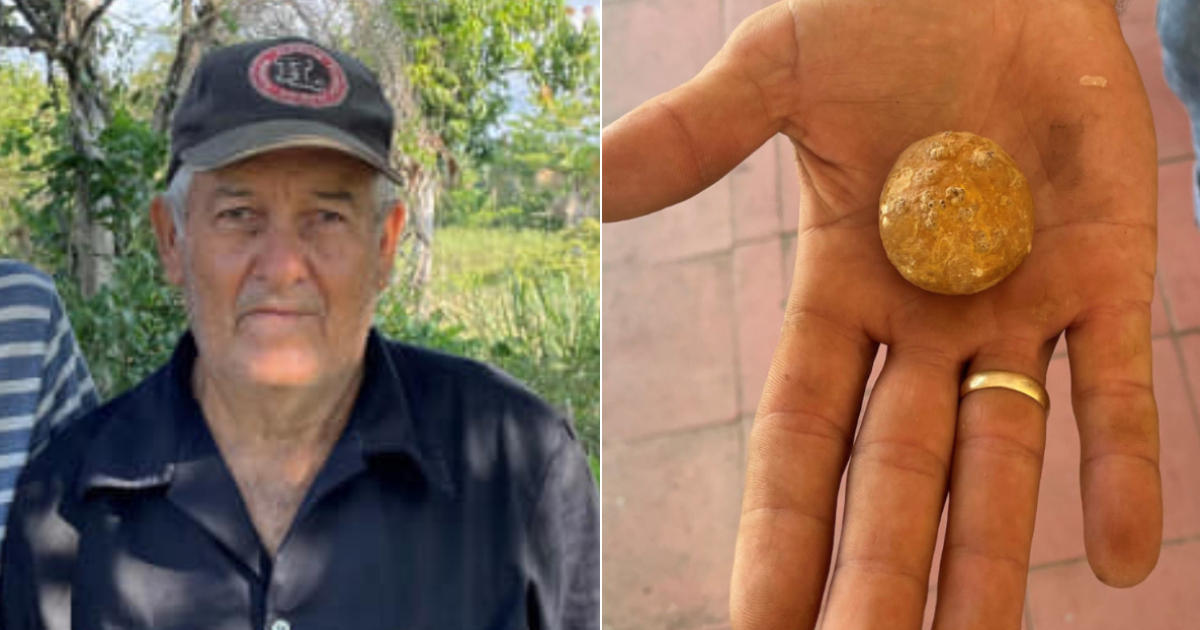A 74-year-old Cuban man made headlines following a successful surgical intervention in Pinar del Río to address a severe urological condition, resulting in the removal of an enormous bladder stone.
Israel Bruguera García underwent a series of complex medical procedures to extract a large stone from his bladder and had a radical prostatectomy, completely removing his prostate. The news was published this Friday in Guerrillero, a local pro-government newspaper that interviewed Israel and his son, and shared photographs of the enormous bladder stone, which was the size of a ping pong ball.
Complications and Treatment
The extraction of the bladder stone involved the removal of hard mineral masses found in the organ, marking just the beginning of Israel's medical journey. A large bladder stone can cause intense pain, recurrent urinary infections, and difficulty urinating. In Israel's case, the extraction and subsequent radical prostatectomy led to urinary incontinence, a common complication following such procedures.
To manage the urinary incontinence, Israel had to use a catheter and a permanent tube for over two years. While effective, this method is uncomfortable and can cause infections if not properly managed. Israel faced significant difficulties, including obstruction and displacement of the tube, which affected his quality of life and ability to work on his farm.
Eventually, Israel was referred to the Hermanos Ameijeiras Hospital in Havana, where he was diagnosed with the need for an artificial urinary sphincter. This device is crucial for those suffering from severe urinary incontinence.
The artificial urinary sphincter consists of a pressure cuff, a pressure-regulating balloon, and a control pump. The cuff is placed around the bladder neck and inflates to close the urethra, preventing urine leakage. The pressure-regulating balloon is placed in the abdomen, and the pump in the scrotum. To urinate, the patient presses the pump, transferring fluid from the cuff to the balloon, allowing the sphincter to relax and the bladder to empty. The cuff automatically reinflates within minutes, ensuring the urethra remains closed until the next use.
The operation was a success, and although the recovery included a month of intensive care and bladder-stretching exercises, Bruguera García now enjoys a quality of life he did not have before.
Healthcare Crisis in Cuba
Israel's story is a success amid the collapse of public health services in Cuba. The lack of investments, the decay of hospital facilities, the exodus of doctors, and pharmaceutical shortages impact the medical needs of the population.
Not all Cubans diagnosed with conditions similar to Israel's are as fortunate. Many have to wait years for a surgery appointment due to the lack of proper operating rooms, surgeons, medical equipment, anesthesia, or even electricity.
At the end of November 2023, a desperate Cuban man took to the streets with a sign addressed to the Cuban authorities, pleading for surgery to remove a massive kidney stone. "Mr. Health Minister, I have been suffering from pain for 5 years. I can't eat or sleep because of an 80 mm kidney stone. I need urgent surgery," read the sign carried by Iván Peña, who said he would "pay anything" to have the stone removed.
In mid-November, a desperate Cuban father turned to the internet for help, as his 15-year-old daughter had been awaiting surgery for two weeks without the necessary supplies or medical personnel. Ezequiel Álvarez reported on Facebook that the girl was in the neurosurgery ward of the Juan Manuel Márquez Children's Hospital in Havana, where children had been waiting for over four months for a solution due to resource and doctor shortages.
In April, Cuban journalist Betsy Anaya reported that the Centro Habana Pediatric Hospital lacked sutures for emergency medical care.
These cases are just a few of the many social media posts that frequently surface, denouncing the collapse of Cuba's public health system, the malpractice of some specialists, or the abandonment of patients who do not receive the treatments or care they need.
The most well-known recent case is that of Cuban child Amanda Lemus Ortiz, who suffered from biliary atresia and required a liver transplant for her cure. Despite her father's compatibility as a donor, the operation was never performed in Cuba, where Amanda and her parents spent years fighting and waiting for a solution. Finally, thanks to a civil society solidarity campaign, Amanda underwent a liver transplant in Spain in March and, despite her delicate health, continues to show signs of improvement.
FAQs about Bladder Stone Surgery and Healthcare in Cuba
Given the serious nature of the healthcare issues highlighted in Israel Bruguera García’s case, here are some frequently asked questions and answers that might help readers understand more about bladder stone surgery and the broader healthcare crisis in Cuba.
What are the common symptoms of a large bladder stone?
Common symptoms include intense pain, recurrent urinary infections, and difficulty urinating.
What is an artificial urinary sphincter and how does it work?
An artificial urinary sphincter consists of a pressure cuff, a pressure-regulating balloon, and a control pump. It helps those with severe urinary incontinence by closing the urethra to prevent urine leakage and allowing control over urination.
Why is there a healthcare crisis in Cuba?
The healthcare crisis in Cuba is attributed to the lack of investments, decay of hospital facilities, exodus of doctors, and shortages of pharmaceuticals and medical equipment.
How can patients in Cuba get the medical attention they need?
Patients often have to wait for extended periods due to the lack of resources and medical personnel. Some turn to social media or public protests to seek attention and assistance.
